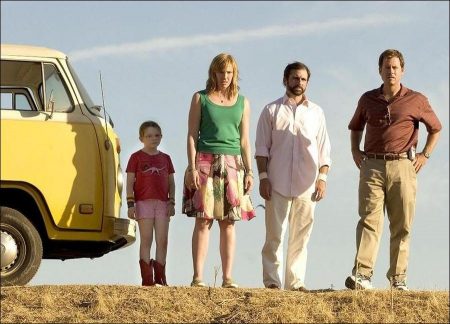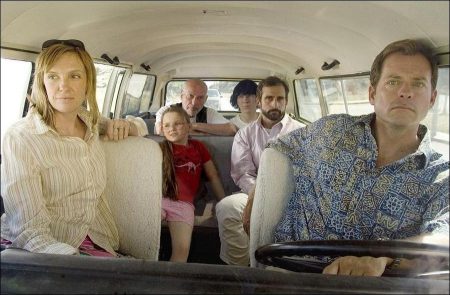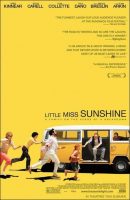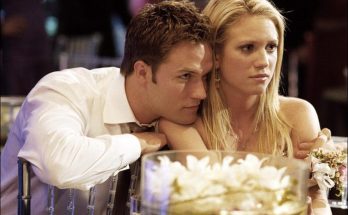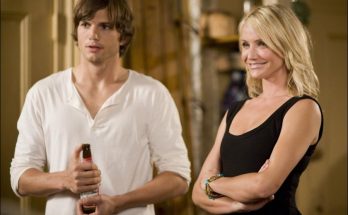Taglines: Where’s Olive?
“A real loser isn’t someone who doesn’t win. A real loser is someone so afraid of not winning they don’t even try.” — Grandpa
Little Miss Sunshine is an American family road comedy that shatters the mold. Brazenly satirical and yet deeply human, the film introduces audiences to one of the most endearingly fractured families in recent cinema history: the Hoovers, whose trip to a pre-pubescent beauty pageant results not only in comic mayhem but in death, transformation and a moving look at the surprising rewards of being losers in a winning-crazed culture.
A runaway hit at the Sundance Film Festival, where it played to standing ovations, the film strikes a nerve with everyone who’s ever been awestruck by how their muddled families seem to make it after all. Then there are the younger Hoovers with their unlikely dreams – the four-eyed, slightly plump, seven year-old would-be beauty queen Olive (Abigail Breslin) and Dwayne (Paul Dano), an anger-fueled, Nietzsche-reading teen who has taken a staunch vow of silence until he gets into the Air Force Academy. Topping off the family is the grandfather (Alan Arkin), a foul-mouthed pleasure-seeker recently kicked out of his retirement home for snorting heroin.
They might not be the picture of perfect mental health, but when a fluke gets Olive invited to compete in the fiercely competitive “Little Miss Sunshine” competition in California, the whole Hoover family rallies behind her. They pile into their rusted-out VW bus and head West on a three-day tragicomic journey filled with madcap surprises and leading up to Olive’s big debut – which will change the entire misfit family in ways they could never imagine.
The Road to Redondo Beach
Five years in the making and an underdog that like the Hoovers was nearly passed over, LITTLE MISS SUNSHINE ultimately prevailed through the passion of its producers, directors and stars. The project began when promising writer Michael Arndt’s screenplay came to producing partners Marc Turtletaub, David T. Friendly and Peter Saraf of Big Beach — and they instantly found themselves disarmed by the offbeat but distinctly American family at the heart of the comedy.
“I think there is only one other time in my entire life I had such a visceral reaction to a film as I did with this one,” says Friendly. “The feeling in my gut said that I had to make this movie. It’s a very rare thing to find a film that really makes you laugh and then can turn around and make you cry like this one.” Adds Saraf: “What really stood out to us is that there was something in each of these characters for the audience to relate to.”
Big Beach soon joined up with Bona Fide Productions’ Albert Berger and Ron Yerxa to kick the project into gear. Berger and Yerxa were likewise drawn in by the screenplay’s mix of cutting humor and raw truth, as well as its ultimate optimism about how families survive and even thrive in spite of themselves. As Yerxa notes: “Every character in this story undergoes a major transformation, – even the family’s VW bus.” Berger adds: “LITTLE MISS SUNSHINE is the family vacation movie revisited – but in a fresher, darker way and with a lot more honesty about how families really interact and love one another.”
Searching for a director with a point of view as distinctive as the screenplay’s comic edge, the producers ultimately brought the film to the rare husband-and-wife team of Jonathan Dayton and Valerie Faris. Already known as award-winning music video and commercial directors, Dayton and Faris had been searching for years to fall in love with a feature film project… to little avail. But as soon as they read the screenplay for LITTLE MISS SUNSHINE, they knew this was it. They were instantly off and running with ideas about how to capture the wild emotional vicissitudes of the family road trip as they have never been seen before, further impressing the producers.
“Jonathan and Valerie had such a passionate take on the film right from the start that they immediately won our trust,” says Turtletaub, “and they really hung with us through the entire process.”
Says Albert Berger: “We always had a good feeling about them because their videos had both a visual flair and humanism to them. They’re cutting edge but they also have wisdom and a heartfelt side to them – and in the end, I think they couldn’t have been more right for the project.”
Better known as iconoclasts on the culture’s leading edge, Dayton and Faris didn’t necessarily expect to make their debut with a family comedy – but then they never expected to run into the anything-but-typical Hoover family.
“We joked about the story being a thinking man’s NATIONAL LAMPOON’S VACATION,” says Jonathan Dayton. “A lot of people had come to us with style pieces, but we liked that LITTLE MISS SUNSHINE felt very distant from that world. Sure, we wanted to do something with style, but we loved these characters and that was the most important thing. We wanted the experience to be drawn from what we love most in movies, one that celebrates human eccentricities.”
Adds Valerie Faris: “The story instantly struck a chord with us. We had always wanted to make a film that would ride a lot of tones; that would have a strong emotional life as well as lots of humor. We felt that LITTLE MISS SUNSHINE was a story that shifts much in the same way that life shifts, moving from drama to farce to reflection and back to farce again.”
But even all the combined fervor for the story, the project kept running into walls, especially because no one wanted to take a risk on a family movie with such a darkly tinged, sardonic wit – until Marc Turtletaub stepped forward to help finance the film out of his own pocket.
“Without all the things we loved about it – the raunchy language, the outrageous behavior – it would have been the perfect family comedy,” laughs Faris. “But we wanted to make a film not about family values, but about the value of family.”
Forging a Misfit Family
From the start, the key to LITTLE MISS SUNSHINE clearly lay in finding a cast who could make the Hoovers and all their dysfunction funny yet at the same time devastatingly real. Dayton and Faris knew it could be a daunting challenge for first-time directors. “We needed to find not only six exceptionally strong actors but six actors who would be able to share the screen, and really become a kind of close-knit family in spite of themselves,” says Dayton. “We needed the kind of actors who are as truthful as they are funny.”
With script in hand, the filmmakers went knocking on the doors of their “dream” cast – and instantly found positive responses. “We had our first choices for every role,” notes producer Peter Saraf.
The casting began with the patriarch of the Hoover family: Richard, who has found himself in the ironic position of being a failed motivational speaker who can’t even seem to motivate anyone to hire him. Nevertheless, Richard is never without a gung-ho, pop-psychology aphorism for every situation, much to his family’s constant chagrin. To bring Richard’s unusual mix of surface optimism and underlying anguish to life, there seemed to be no better person than Academy Award® nominee Greg Kinnear, who began his career as a comedian but has developed into one of Hollywood’s most diverse talents with roles ranging from AS GOOD AS IT GETS to WE WERE SOLDIERS to the recent MATADOR. “Greg is uniquely able to bring real likeability to even the most unlikable characters,” explains Saraf, “so he was perfect for Richard.”
Adds David Friendly: “I’ve been friends with Greg for a long time so I knew he had that hilariously caustic side to him that could really get to this character in a way no other actor could.”
Kinnear was hooked by the screenplay. “I think everyone in this film was attracted to the script,” he says. “You have this family seemingly going on a very simple trip and suddenly you uncover this whole complex family dynamic that leads them towards change. It’s a very darkly funny movie but at the same time it’s also kind of positive and uplifting. It takes unexpected turns that are quite refreshing.”
In approaching Richard and his “refuse to lose” philosophy, Kinnear thought of him as a kind of low-rent Tony Robbins – a guy who wants to believe in the biggest, flashiest, winner-takes-all manifestations of the American Dream, but more often than not finds himself on the losing side of life. “Richard’s full of misguided philosophies,” Kinnear laughs. “He really believes in the idea that you have to try to win at everything but when it comes to the `Little Miss Sunshine’ beauty pageant he suddenly finds everything he believes in coming into conflict with his daughter’s happiness.”
One of most exciting elements of LITTLE MISS SUNSHINE for Kinnear was getting the chance to work with Alan Arkin as his utterly opposite father. “Alan is very funny and also a truly fantastic actor,” he comments. “Ours was an interesting relationship to explore because while Richard’s father is this eccentric, spontaneous, old guy who dabbles in heroin, Richard is this very uptight, self-help, self-responsibility guru, which maybe was his way of rebelling. The key was balancing the characters’ eccentricities while keeping them accessible.”
Perhaps the film’s least eccentric character is the Hoover’s one rock: Sheryl – a divorcee desperately trying to make her second family work, in spite of their overwhelming oddities. The role went to Australian star Toni Collette, who garnered an Academy Award nomination for her work in THE SIXTH SENSE and has gone on to diverse but widely acclaimed roles in such films as THE HOURS, ABOUT A BOY and JAPANESE STORY, most recently appearing in the ensemble comedy IN HER SHOES. Faris and Dayton went to Collette because they knew she had a broad range of comic skills – yet also the ability to bring real depth and honesty to an embattled Middle American mother such as Sheryl. “She’s a world-class actress who has that remarkable ability to bring something special to everything she does,” says David Friendly.
Like Kinnear, Collette was seduced by the Hoover family with all their inglorious attempts at achievement. “I absolutely loved the script and also really loved this dysfunctional family who are just learning to get along for the first time,” she says. “I got completely involved with them. Their frustrations and their yearnings felt very real to me and also quite universal. I found myself laughing and crying at the same time even as I read it.”
Collette also could relate to the quandary faced by Sheryl as she constantly tries to play diplomat, peace-maker and merry homemaker, while her family goes to pieces. “Family means everything to Sheryl,” she observes. “So she feels that she would do absolutely anything to smooth things over and make everyone happy – whatever that might take.”
It takes a lot when it comes to Sheryl’s brother, who recently attempted suicide after a downward spiral that began with a mixture of unrequited love, his failure to win a MacArthur “Genius” Grant, and losing his self-proclaimed position as America’s pre-eminent Proust scholar. Happiness doesn’t come naturally to Frank, but popular comedian Steve Carell brings a dash of irreverence to his portrait of despondency.
Although Carell has since become one of Hollywood’s hottest comic stars, at the time he was cast in the film, he was a virtual unknown. “Steve’s intelligence as a performer is what sold us,” says co-director Dayton of Carell. “He’s hilarious but he also can do absolutely anything — he’s kind of amazing that way.” Adds producer Albert Berger: “What’s amazing is that no one really knew who Steve was when we cast the role, but he not only turned out to be a big star he also turned out to be a brilliant choice.”
Carell feels that the Hoovers – for all their comical foibles and failings – aren’t that different from most families. “There’s an underlying current of love between these characters,” he observes, “that ultimately keeps them together and bonds them. In any family, I think there are times when you will detest another person but you can never get away from the fact that you are always connected by blood and will be pulled together when there’s really a crisis, as the Hoovers are on their way to California.”
Yet even as the family trip starts to rapidly go south, Frank only grudgingly starts to join in his family’s exploits. “I think Frank is initially full of crap,” laughs Carell. “He’s this self-proclaimed expert on Proust who thinks of himself as a great intellectual, yet when he’s faced with real relationships, he’s completely lacking.”
It was Frank’s transformation – from self-obsessed depressive to the beginnings of tentative connection – that struck Carell as a fascinating challenge. “He starts in a very dark place but what I love about the role is that over these few days, you see him gently lifted up, you see his dark layers being peeled away as he becomes more involved with the family,” he says. “You start to see the love shine through, but the film never gets sappy or sentimental. It always brings you back to the lightness and comedy of it all.”
The prospect of working with such a talented group of actors was another added bonus for Carell. “When I found out who the cast was going to be, I was a little intimidated and in awe,” he recalls. “I kept thinking what am I doing here? How do I fit into this mix? It was really exciting to just meet these people, let alone work with them.”
Among the actors Carell was most thrilled to meet was Alan Arkin, the veteran star of stage, screen and television who really sunk his teeth into playing one of the most unusual grandfathers seen on the screen – an outspoken, 70-something heroin addict and porn aficionado who nevertheless serves as an inspiration to his misfit granddaughter.
“This was a really fun part to cast,” says Dayton. Adds Faris: “We’ve loved Alan forever. For us, working with him was kind of like working with the Beatles.”
As with his cast-mates, the draw for Arkin was Michael Arndt’s heartbreakingly comical script. “I loved that it doesn’t telegraph anything,” he remarks. “It leaves room for the audience to exert their own imaginations.”
In playing the defiantly free-wheeling grandfather, Arkin enjoyed the freedom of being able to take his character beyond the usual limits for a character of a certain age. “It’s a great role, because the grandfather is unabashed about everything. He’s completely out there, completely out in the open, there’s nothing hidden about him, and that was one of my favorite things about him,” he observes. “He’s a guy who always says what he feels – but what he feels also changes from minute to minute.”
Arkin continues: “The whole family is very unusual and amazing. Yet somehow with all the adversity between them as individuals, there is also a real love that glues them together.”
With the adults cast, the film’s biggest crux became finding the two Hoover children – both highly complex roles for young actors that had to be both funny and affecting. To play teenaged son Dwayne, the filmmakers needed to find that rare person who could make his character intriguing while never uttering a word; instead writing most of his lines on a small white notepad. They found what they were looking for in rising star Paul Dano. Having already established a reputation as a teen with exceptional versatility in roles ranging from HBO’s “The Sopranos” to the urban drama L.I.E. to THE BALLAD OF JACK AND ROSE with Daniel Day Lewis, the filmmakers were impressed with Dano’s ability to express himself in the nuanced manner of a silent screen star.
“Paul was really impressive because he goes way beyond the clichéd angry teen,” says Jonathan Dayton. “There was never a false moment from him.”
Dano loved the script, but the deal was sealed for him when he learned more about directors Dayton and Faris. “When I found out they did some of the Smashing Pumpkins videos, which are some of my favorite music videos ever, I knew I wanted to work with them,” he says. “I think they’re really talented.”
Yet Dano soon found that taking on a character steeped in nihilism and silence was the biggest challenge of his career to date. “It was actually a lot harder than I thought it would be,” Dano admits. “You have to constantly react and find completely original ways of expressing yourself. You can’t just sit there doing nothing – that would be totally boring.”
To see what Dwayne lips-sealed life would really feel like, Dano spent a number of days undergoing his own self-imposed vow of silence. “That was really, really tough,” he says. “It was especially hard around my family, because they were driving me nuts at times, but it was also helpful to see how frustrating it actually felt.”
Despite Dwayne’s unconventional peculiarities, Dano also sees him as being in many ways a typical American teen trying to figure out who he is and what is most important in life. “I think Dwayne’s someone a lot of people will identify with right away,” he says. “Everyone goes through a period where they don’t really like their family, but you also know that you will always have some kind of bond with them. When you’re 15, I think you start to lose your innocence and you see that these people around you are kind of crazy and you’re not sure if you really want to participate in that, which is why Dwayne takes his vow of silence. But then when he finally cracks, when he’s in his most vulnerable moment, his family is there for him and I think he’s actually able to take that in.”
Finally, came the character who brings all the Hoovers unexpectedly together in her improbable dream to become “Little Miss Sunshine”: Olive. To find Olive, the filmmakers set out on a big national search for a seven year-old with the maturity and talent to drive much of the film’s comedy – while still being very much an ordinary little girl. It seemed to be an exceedingly tough bill to fill until they came across Abigail Breslin who made an auspicious feature film debut as Mel Gibson’s daughter in SIGNS.
“We first saw Abigail in an audition tape and then we saw her on Jay Leno,” recalls Valerie Faris. “What really impressed us is that she was totally unaware of the audience. She had this really intense focus that we knew was perfect for Olive.”
In conversations with Abigail it soon became clear that even at her young age, she already had a lot of insight into what makes the Hoovers tick. “They’re a family you don’t really see all the time,” says the seven year-old. “They’re not the perfect family that you usually see in movies and magazines. But I think on this trip they learn things about each other that they never thought they would. And what the movie’s about is that even though not every family’s perfect, even the imperfect family can still love each other just as much.”
Breslin even sported a child-sized fat-suit in order to portray Olive’s plumpness, which becomes particularly apparent when the irrepressible Olive finds herself amidst svelte, preening miniature beauty queens in California. Along the way, Breslin also developed a lot of affection and even admiration for her character’s ability to stay in her own world. She calls Olive “really brave.” “You might not expect her to be a beauty queen but I think she’s actually really cool,” she says, “because she really believes in herself.”
It was Breslin’s ability to bring the character to life that also inspired the rest of the cast. Says Greg Kinnear of her performance: “Everything’s seamless. It’s like she’s not even acting. She’s just all honesty and truth coming through in every scene, and there’s nothing better than that.”
Once the cast was assembled, Faris and Dayton began looking for ways to help them develop the ineffable affection, conflicts, quirks and complicated dynamics of a real family, setting aside a significant amount of time for rehearsals. “We had a whole week together before we shot during which we did lots of improvising with each other,” recalls Arkin. “We really started to get a feel for how the characters felt about each other and who we were as a family.”
Part of the bonding process, was an actual “family field trip” that gave the cast a taste of what was to come. “We all got into a van, drove for awhile and then had lunch, staying in character the whole time,” explains Steve Carell. “Alan Arkin was sitting behind me and he just kept going `ooohhh, uhhhhh, I’ve gotta go to the bathroom.’ Just trying to stay in character was almost impossible because every five minutes you’d hear, `uuuuhhhh, ahhh, ohhh’ – and it was killing us. I finally had to turn around and not look at him because it was just way too funny.”
Little Miss Sunshine (2006)
Directed by: Jonathan Dayton, Valerie Faris
Starring: Alan Arkin, Abigail Breslin, Steve Carell, Toni Collette, Paul Dano, Greg Kinnear, Marc Turtletaub, Jill Talley, Brenda Canela, Julio Oscar Mechoso
Screenplay by: Michael Arndt
Production Design by: Kalina Ivanov
Cinematography by: Tim Suhrstedt
Film Editing by: Pamela Martin
Costume Design by: Nancy Steiner
Set Decoration by: Melissa M. Levander
Art Direction by: Alan E. Muraoka
Music by: Mychael Danna, DeVotchKa
MPAA Rating: R for language, some sex and drug content.
Distributed by: Fox Searchlight Pictures
Release Date: July 26, 2006
Visits: 37
